 |
 |
 |
 |
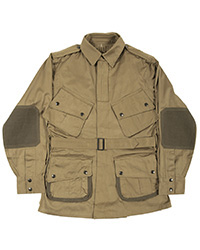
|
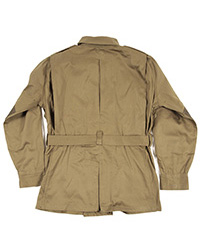
|
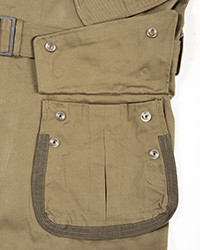
|
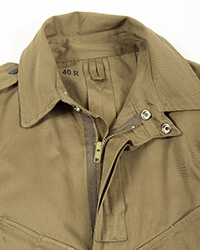
|
|
ATF product
|
Bi-swing back
|
US made snaps by Scovil
|
Solid brass Talon zippers
|
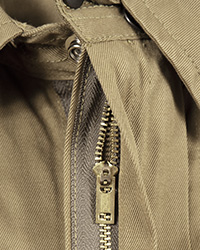
|
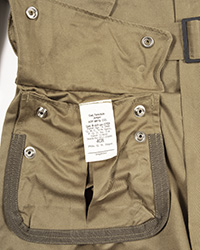
|
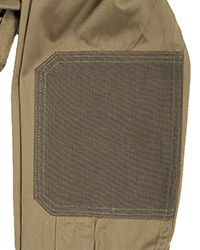
|
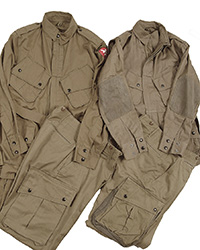
|
Correct "Serval" zippers
on the knife pocket
|
WWII pattern spec labels with
period stock & contract numbers
|
Correctly sewn reinforcing
|
Real WWII color- our colors standards
come from original examples which
were actually olive drab, not khaki
|
During early airborne operations in North Africa and Italy, the M1942 uniform was found to be lacking in several areas, most notably strength. The fabric is relatively thin (originals were not made from denim as some characters assume) and some seams should have had extra material added. The knees and elbows wore out easily, the pockets sometimes blew out due to the opening shock of parachutes and the single stitch in the crotch seam led to an awful lot of "free balling".
Sometime prior to Overlord, divisional riggers were directed to fix these problems. The riggers of the 82nd and 101st each came up with a similar though not quite identical fix. Heavy olive drab canvas was used to make elbow and knee patches, and reinforce the edges of the cargo pockets. Leg ties were added to the trousers to help compress the bulging hip pockets. Small variations exist in the way they are stitched between the 82nd and 101st, but they are essentially the same. Each paratrooper was to turn in one of his two issue sets for reinforcing prior to the Overlord jumps. Many paras did not receive them back in time for the jump, so some had them, others did not. In other words, either style is correct for the period.
Our Reproductions: This is the new generation of ATF's M1942 Jump Uniforms. In 2019 we switched to a new contractor for these uniforms and thus spent a great deal of time reinventing the wheel. We already had the patterns made from our original uniforms, but there were several details that I had sought to improve upon, and this proved to be the perfect opportunity. This new run (2022) is by far the best yet- we were able to accomplish all of the changes I set out make save for two.
The majority of the new details are rather minor, but their sum makes for more authentic garment. As for the pattern, there were a myriad of adjustments to the small parts: The pocket shapes, knife pocket, front skirt, and collar were all tweaked slightly to conform to a particular size 44R jacket in my hoard. One of the smallest yet neatest things is that we were able to get the "Serval" zippers for the knife pocket reproduced. We have retained the zinc plated Scovil brand snaps and solid brass Talon zippers.
The biggest change is the fabric. For years, a handful of "hardcore" paratrooper enthusiasts have asked us to improve the cloth. Cotton twill is still commonly used today, but WWII fabric is thinner, yet more densely woven which gives it a bit of a sheen and slick feel, while maintaining the same weight. This really only apparent if one is holding an original in one hand and a reproduction in the other. We succeeded in getting the cloth recreated, but the finished edge (visible on the inside of the rear seam of original jackets) was not possible as the old-style looms required to make it were not available.
As always, we had the fabric made in the same color used in WWII; olive drab no. 3- not khaki (beige). This run is what I'll call a golden olive tan. As always, there were 3-4 dye lots in this production run so not every uniform is the exact shade as all the others. Any variation will be minor, but full disclosure and all.
The last change is a 50/50 improvement. For years we've tried to get the original style spec labels made- those appear to have been screen printed on coated cotton muslin. The new labels are printed on cotton and look very good, but the raw ends tend to unravel when they're washed. They need a better white coating before printing- we're working on that.
Imported
|
|
 |
 |
 |
 |


|